One of the greatest runs in NFL history has come to an end. After 24 seasons with the New England Patriots, Bill Belichick is no longer the coach of the franchise he helped lead to six Super Bowl victories.
The 71-year-old Belichick is without question the best coach of the 21st century. He has won three times as many Vince Lombardi Trophies this century than any other head coach. Belichick showed that dynasties can still exist in the free agency/salary cap era.
Nothing lasts forever, however, and Belichick’s run came to an end on Thursday. Belichick and Kraft agreed to amicably part ways after New England suffered a third losing season in four years.
Given Thursday’s news, we decided to rank the top-10 coaches in NFL history, a list that will surely continue to include Belichick’s name for many years to come. The criteria when making this list includes total wins, winning percentage, championships won, overall success in the postseason, and impact on the game.
10. Curly Lambeau
The first coach in Packers history, Lambeau, who was also a tailback/fullback for the Packers during his first nine seasons as coach, led Green Bay to six NFL championships that included three straight titles from 1929-31 (before to the NFL instituted a championship game to determine its champion in 1933). Lambeau’s 1929 team was the first NFL team that did not suffer a loss, going 12-0-1. In all, Lambeau’s Packers went 34-5-2 during that span while becoming the first team in league history to win three straight titles.
From 1936-44, Lambeau led the Packers to five NFL Championship Games, winning three of those games. In 29 seasons with the Packers, Lambeau compiled a 212-106-21 record. After leaving the Packers after a 2-10 campaign in 1949, Lambeau spent two seasons apiece with the Cardinals and Redskins, posting a 17-28-1 record during that span.

Getty Images
9. Joe Gibbs
Gibbs spent his entire 16-year as an NFL head coach in Washington, leading the Redskins to four Super Bowls and three Super Bowl victories from 1982-1991. Gibbs is the only coach in NFL history to win three Super Bowls with three different starting quarterbacks in Joe Theisman, Doug Williams and Mark Rypien. Overall, Gibbs posted a 154-94 regular season record and a 17- 7 postseason record.
Despite playing in the ultra-competitive NFC during the 1980s/early ’90s, no team played in more Super Bowls than Gibbs’ Redskins during their 10-year run. The only team that matched Washington’s level of success during that time was the 49ers, who also appeared in four Super Bowls during that span. The Redskins were also able to defeat some of the greatest teams in league history. Washington defeated the 49ers in the 1983 NFC title game, and three years later, they defeated the defending champion Bears in the divisional round of the playoffs. Gibbs’ Redskins also blew out John Elway’s Broncos and Marv Levy’s Buffalo Bills in Super Bowl competition.
Gibbs was able to win two of his championships during seasons that were impacted by NFL strikes. The ’82 Redskins, who went 8-1 during the regular season, won four playoff games behind the legs of Hall of Fame running back John Riggins and an offensive line that was nicknamed “The Hogs.” Five years later, the Redskins went 3-0 with a roster filled with replacements after players went on strike during the season. Washington ended up winning the Super Bowl that season, scoring a record 35 points in the second quarter of its 42-10 win over Denver.
The biggest black eye on Gibbs’ resume is Super Bowl XVIII, when the defending champion Redskins were blown out by the Raiders, 38-9. Gibbs’ second stint in Washington (from 2004-07) was also underwhelming, as the Redskins went 30-34 with one playoff win during that span.
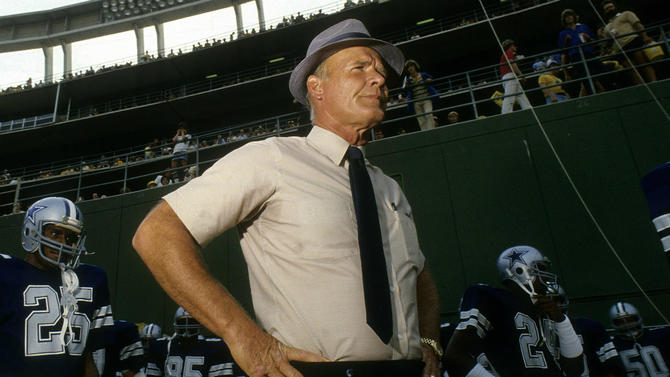
Getty Images
8. Tom Landry
Fourth all time in wins by an NFL head coach, Landry patrolled the sideline in Dallas during the Cowboys’ first 29 seasons. Landry’s teams posted a winning record for 20 consecutive seasons while making the playoffs 18 times during that span.
After losing two NFC title games to the Packers as well as the team’s first Super Bowl appearance in 1970, Landry’s Cowboys finally got over the hump in 1971, holding Shula’s Dolphins to just three points in Dallas’ win over Miami in Super Bowl VI. During the 1970s, the Cowboys would appear in five Super Bowls, defeating the Broncos in Super Bowl XII and losing to the Steelers — both times by four points — in Super Bowls X and XIII. Landry’s Cowboys would remain competitive for most of the 1980s, with three straight NFC title game appearances from 1980-82.
Landry was an innovative coach on both sides of the ball. His Flex 4-3 defense wreaked havoc over opposing offenses, while his shotgun-oriented offense, led by Roger Staubach, was far ahead of its time.
Landry’s 20-16 playoff record and 2-3 record in the Super Bowl are among the reasons why he isn’t higher on this list.

Getty Images
7. Bill Walsh
One of just two coaches on this list that did not win 100 career regular season games, Walsh left a lasting impact on the game despite a relatively short 10-year run as an NFL head coach. The innovator of the West Coast offense, Walsh’s 49ers, with Joe Montana under center, won three Super Bowls during the 1980s while demonstrating a new, efficient way to move the ball down the field. Today, over 30 years since his final game as 49ers head coach, NFL teams still run a variation of Walsh’s offense.
Walsh’s 1984 team is one of the greatest in NFL history. The first team to win 15 regular season games, the 49ers overwhelmed Dan Marino and the Dolphins’ record-setting offense in Super Bowl XIX, picking off Marino twice while shutting out Miami’s offense during the second half of San Francisco’s 38-16 victory. Four years later, Montana’s brilliant execution of Walsh’s offense during the closing moments of Super Bowl XXIII resulted in Montana’s game-winning touchdown pass to John Taylor with less than a minute remaining. Walsh, who retired after his team’s second Super Bowl win over the Bengals, moved into the front office the following season, when the 49ers became the fourth NFL franchise to win back-to-back Super Bowls.
While Walsh’s legacy within the NFL is secure, his lack of longevity as well as the 49ers’ lackluster playoff showing against the Giants in 1986 and the Vikings in 1987 prevents him from being higher on this list.
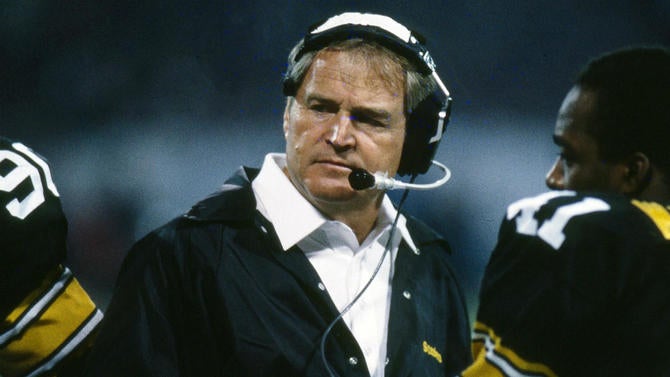
Getty Images
6. Chuck Noll
One of the main architects of the Steelers’ 1970s dynasty, Noll turned a perennial losing franchise into an NFL powerhouse within three years of coming to Pittsburgh. After going 1-13 during his first season, Noll’s Steelers won their first-ever division title in 1972. Two years later, Pittsburgh won the first of four Super Bowl titles over a six-year span. Noll’s Steelers, who went 4-0 in Super Bowl competition, are still the only team to win back-to-back Super Bowls twice. The ’79 Steelers are the last Super Bowl championship team that was comprised of only homegrown talent.
Noll’s fundamentally sound teams became the standard by which future NFL champions would be measured. But what was equally important to Pittsburgh’s success during that era was what they were able to accomplish during the draft. In 1974, the Steelers drafted four future Hall of Famers in Lynn Swann, Jack Lambert, John Stallworth, and Mike Webster. Donnie Shell, an undrafted rookie that season, will be inducted into the Hall of Fame later this year. Previous drafts also produced Joe Greene, L.C. Greenwood, Terry Bradshaw, Mel Blount, Jack Ham, Franco Harris, and many other players that would help make up arguably the greatest team of the Super Bowl era.
While still competitive, Noll’s Steelers were unable to sustain their level of success during the 1980s, as Pittsburgh advanced to just one AFC title game during Noll’s final 12 seasons as coach. But the overall legacy Noll left behind in Pittsburgh, a legacy of winning and building tough, blue collar teams that symbolizes the city that it plays in, remains in tact to this day.
5. Paul Brown
The sixth-winningest coach in NFL history, Brown had already won championships at the high school and college levels before helping create the Browns in 1946. Cleveland was an immediate success under Brown, winning four consecutive All-American Football Conference titles before Cleveland joined the NFL in 1950. Despite playing against better competition, the Browns continued to dominate, winning the NFL title that season while posting a 12-2 overall record. Cleveland would then win back-to-back NFL titles in 1954 and ’55 while becoming the decade’s premier team.
Brown’s time in Cleveland ended on unceremonious terms, however, as he was relieved of his duties after the 1962 season (the Browns would win their fourth and most recent NFL title in 1964). Brown returned to the sidelines as head coach of the expansion Cincinnati Bengals in 1968, guiding the Bengals to three playoff appearances from 1970-75.
In many ways, Brown was a trailblazer. He is credited with helping lay down the foundation for how coaches conduct their schedule as it relates to weekly preparation. Brown also served as a mentor for Bill Walsh, who served as his offensive coordinator in Cincinnati before going on his run of success in San Francisco.
4. George Halas
No. 2 on the all-time wins list, Halas is the only NFL coach that has won an NFL title in four different decades. After winning his first NFL title in 1921, Halas won his last championship in 1963, an example of his ability to adapt to the ever-changing climate that is professional football. In all, Halas, who was also a player from 1920-29, won eight NFL titles while posting a career record of 318-151-31.
Halas is credited as being the first coach to conduct daily practice sessions that included film study of the opposing team. With Halas in charge, the Bears are also credited as being the first pro football team to publish a team newspaper and to broadcast their games on the radio.
Why is Halas not higher on this list? His 1934 team, the first team to go 13-0 during the regular season, was unable to complete their perfect season, falling to the Giants in the championship game. He was also unable to lead the Bears to the postseason during the final years of his coaching career despite the selections of Dick Butkus and Gale Sayers in the 1965 draft.
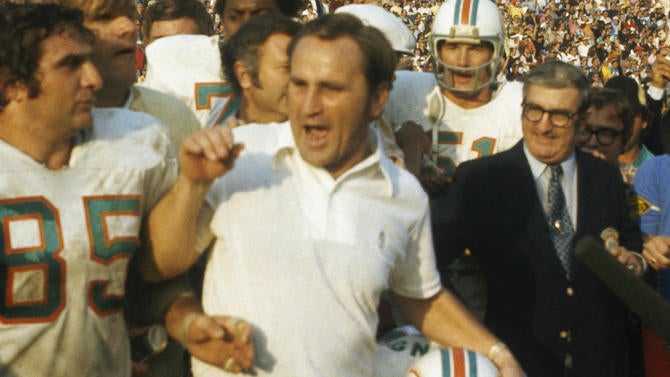
Getty Images
3. Don Shula
Shula’s 328 regular-season wins and 347 total wins remain all-time records. In 33 seasons as an NFL head coach, Shula posted a whopping 31 winning seasons. His 1972 Dolphins team remains the only team in NFL history to finish the season with a perfect record.
After leading the Colts to a 13-1 record en route to a Super Bowl appearance in 1968, Shula inherited a Dolphins team in 1970 that had won just 15 games in their first four years of existence. During Shula’s first six seasons in Miami, the Dolphins posted a 75-19-1 record that included three AFC titles and back-to-back Super Bowl titles. During that span, Miami became the first franchise to appear in three consecutive Super Bowls. During the ’72 and ’73 seasons, the Dolphins went a combined 32-2 while joining the 1960s Packers as the only two-time Super Bowl champions.
Shula’s Dolphins continued to be a force to be reckoned with heading into the 1980s, as Miami represented the AFC in Super Bowls XVII and XIX. And after primarily winning using a punishing rushing attack during the early ’70s, Shula unleashed a prolific passing attack in the ’80s, led by Hall of Fame quarterback Dan Marino.
Shula is credited with helping modernize the game. In 1978, as head of the NFL’s Competition Committee, Shula inspired several rule changes that helped make it easier for offenses to have success in the passing game. The result was a higher scoring, more entertaining brand of football that helped pro football replace baseball as America’s No. 1 pastime heading into the 1980s.
While there aren’t many black marks on Shula’s resume, the Colts’ shocking upset loss to Joe Namath and the Jets in Super Bowl III, along with his inability to win a Super Bowl with Marino, are two things Shula would have surely loved to change as it relates to his Hall of Fame career.
2. Vince Lombardi
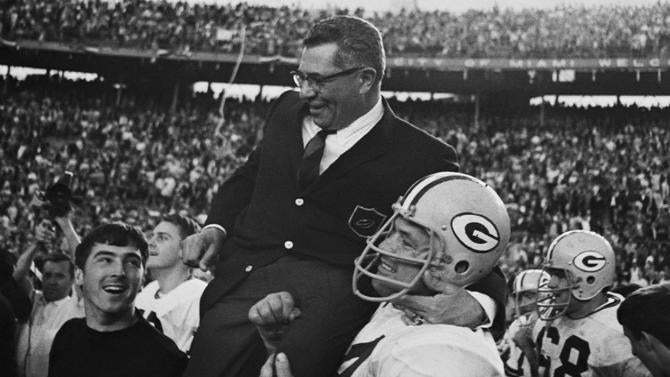
Getty Images
2. Vince Lombardi
While his career as a head coach was relatively short, Lombardi left an enduring mark on pro football during his nine seasons as the Green Bay Packers’ head coach. The only coach to win five titles in a seven-year span, Lombardi’s Packers are also the last team to win three straight NFL titles that included the first two Super Bowl games.
The master of motivating his players, Lombardi was also a meticulous planner, as the Packers were seemingly ready for anything the opposition ran at them. Lombardi was also a pioneer as it related to the draft, as he was the first coach to draft African American players in the first round.
Along with boasting a gaudy .738 regular season winning percentage, Lombardi posted an even more impressive 9-1 postseason record, with the Packers posting impressive postseason wins over Jim Brown and the Cleveland Browns, Tom Landry’s Cowboys (twice) and Hank Stram’s talented Chiefs team in Super Bowl I.
Lombardi’s impact on the NFL was so immense that the NFL decided to name the Super Bowl championship trophy in his honor shortly after his death in 1970.
No. 2 all-time in career wins, Belichick is the only coach in NFL history to win nine conference titles and six Super Bowl titles. Under Belichick’s watch, the Patriots posted 19 consecutive winning seasons, 17 straight playoff seasons, and have won 17 division titles.
Belichick, who has mastered the art of fielding perennially competitive rosters in the modern era of free agency, averaged nearly 12 regular season wins a season from 2001-19. His .705 postseason winning percentage is the highest amongst the top-25 coaches in league history in terms of regular season games won. From 2010-18, the Patriots secured either the AFC’s No. 1 or No. 2 seed while making eight straight appearances in the AFC Championship Game. The second team in NFL history to win three Super Bowls in a four-year span from 2001-04, the Patriots won three more Super Bowls over a five-year span from 2014-18 while solidifying their place as the greatest franchise in pro sports during the 21st century.
A two-time Super Bowl winning assistant coach with the New York Giants, Belichick also helped build a competitive team in Cleveland in the early 1990s. The Browns’ win over Bill Parcells and the Patriots in the 1994 playoffs remains the Browns’ most recent postseason victory. The only major glitch on Belichick’s resume is the 2007 Patriots’ inability to finish their perfect season, as New England fell to Eli Manning and the Giants in Super Bowl XLII. His decision to bench Malcolm Butler in Super Bowl LII also remains a mystery.
1. Bill Belichick
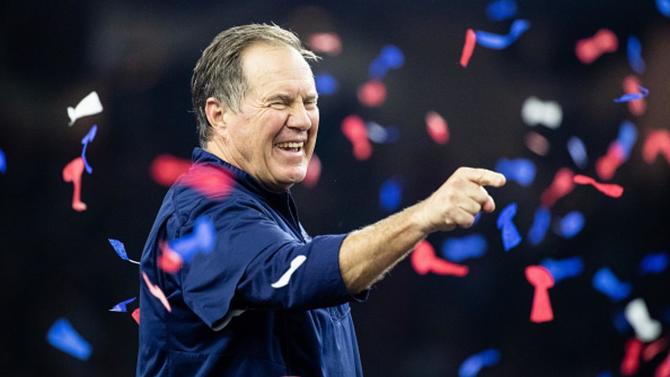
Getty Images
No. 2 all time in career wins, Belichick is the only coach in NFL history to win nine conference titles and six Super Bowls. Under Belichick’s watch, the Patriots posted 19 consecutive winning seasons, 17 straight playoff seasons and 17 division titles.
Belichick, who has mastered the art of fielding perennially competitive rosters in the modern era of free agency, averaged nearly 12 regular-season wins a season from 2001-19. His .705 postseason winning percentage is the highest amongst the top-25 coaches in league history in terms of regular-season games won. From 2010-18, the Patriots secured either the AFC’s No. 1 or No. 2 seed while making eight straight appearances in the AFC championship game. The second team in NFL history to win three Super Bowls in a four-year span from 2001-04, the Patriots won three more Super Bowls over a five-year span from 2014-18 while solidifying their place as the greatest franchise in pro sports during the 21st century.
A two-time Super Bowl-winning assistant coach with the New York Giants, Belichick also helped build a competitive team in Cleveland in the early 1990s. The Browns’ win over Bill Parcells and the Patriots in the 1994 playoffs remains the franchise’s most recent postseason victory. Belichick came extremely close to joining Shula as the only coach to preside over a perfect team in 2007.
The Patriots’ recent struggles under Belichick has done little to impact his legacy. No coach is perfect, and that includes the greatest coach of all time.

























